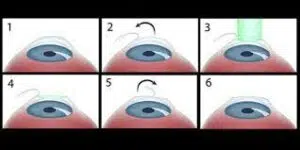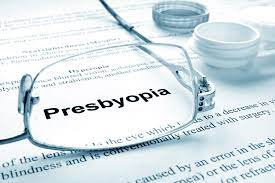If you are starting to experience difficulty seeing close-up, you may be suffering from presbyopia. This is a common eye condition that affects people as they get older. Luckily, there is a solution: LASIK for presbyopia. In this blog post, we will discuss the benefits of LASIK for presbyopia and whether or not it is right for you. Keep reading to learn more!
Contents
What Is Presbyopia?

As you age, your eyesight naturally changes. One of the most common changes is presbyopia, which is when your ability to focus on close objects decreases. This happens because the lenses in your eyes become less flexible over time, making it more difficult for them to change shape and focus light correctly. Presbyopia usually begins around age 40 and affects almost everyone by age 60.
If you have presbyopia, you may find yourself holding books and newspapers at arm’s length or squinting to see clearly. You may also have difficulty reading small print or seeing objects that are close up, like your cellphone or computer screen. These problems can make everyday activities like reading, cooking, and working on crafts more difficult.
Is There A Surgery To Fix Presbyopia?

The short answer is yes, there are surgical options to correct presbyopia. However, these procedures are typically considered a last resort after other methods such as reading glasses or contact lenses have failed.
The most common type of surgery for presbyopia is known as refractive lens exchange (RLE). This procedure involves removing the eye’s natural lens and replacing it with an artificial one. RLE can correct both nearsightedness and farsightedness, as well as presbyopia. It is generally considered safe, but there are some risks involved, such as infection and bleeding.
Another option is known as conductive keratoplasty (CK). This surgery uses radio waves to change the shape of the cornea, which in turn changes the way light enters the eye. CK can correct farsightedness and presbyopia, but not nearsightedness. It is a relatively new procedure and its long-term risks are not yet known.
As with any surgery, there are risks involved. Be sure to discuss all risks and benefits with your doctor before making a decision.
Can Presbyopia Be Corrected With Lasik?
Presbyopia is an age-related condition that typically affects people over the age of 40. It occurs when the eye’s lens becomes less elastic, making it difficult to focus on close objects.
LASIK is a medical procedure to improve vision by correcting the shape of the cornea. With age, however, comes presbyopia- meaning people lose their ability to see close up because the lens in their eye becomes less flexible and elastic.LASIK can’t prevent this natural aging process from happening.
If you are considering LASIK to correct presbyopia, it is important to consult with an experienced eye surgeon who can assess your individual needs.
How Does Lasik Surgery Works For Presbyopia?

The Lasik Works For Presbyopia is as follows:
- The surgeon makes a very small incision in the eye, through which he or she inserts a tiny instrument called a microkeratome. This device is used to create a thin flap of tissue on the surface of the eye. Once the flap is created, the surgeon folds it back out of the way, exposing the underlying cornea.
- The next step involves the use of an excimer laser, which is used to reshape the cornea. The laser removes tiny amounts of tissue from the cornea, and this helps to correct any refractive errors that are present. Once the laser has been used, the flap is then placed back into its original position.
- The entire surgery usually takes less than 30 minutes to complete, and most people report very little discomfort afterward. In the vast majority of cases, the results of Lasik surgery are permanent and there is no need for any further treatment.
If you suffer from presbyopia and would like to learn more about whether Lasik surgery could help you, please schedule a consultation with an experienced eye surgeon today.
Which Lasik Surgery Is Used To Treat Presbyopia?
Lasik Surgery is used to treat presbyopia is as follows:
Photorefractive Keratectomy or PRK
This surgery is used to correct the vision by altering the curvature of the cornea. It can be used to treat both nearsightedness and farsightedness, as well as astigmatism. PRK is a safe and effective alternative to traditional Lasik surgery and has a shorter recovery time. PRK is an outpatient procedure and can be performed in less than 30 minutes.
Monovision
Lasik is another type of Lasik surgery that can be used to treat presbyopia. This surgery involves correcting one eye for distance vision, and the other eye for near vision. This allows you to see both distant and close objects clearly. Monovision Lasik has a shorter recovery time than traditional Lasik surgery and can be performed in less than 30 minutes. There is no need for stitches, and the risk of infection is very low. You will experience some discomfort and blurry vision for the first few days after surgery, but your vision should improve within a week. Monovision Lasik is not recommended for people with severe vision problems, or for those who have had previous eye surgery. Lasik surgery should only be performed by a qualified ophthalmologist.
If you have presbyopia and are considering Lasik surgery, talk to your ophthalmologist about which type of surgery is right for you. PRK and Monovision Lasik are both safe and effective ways to treat presbyopia and improve your vision.
A Few Things To Keep In mind
There are a few things to keep in mind when considering Presbyopia Lasik. They are:
- The age of the patient: This treatment is only recommended for patients aged 40 years and above.
- The existing refractive error: A significant amount of myopia, hyperopia or astigmatism may not be suitable for this treatment.
- The corneal thickness: Thinner corneas may not be suitable for this treatment.
- The health of the cornea: Patients with certain corneal diseases may not be suitable for this treatment.
If you are considering Presbyopia Lasik, it is important to consult with an experienced eye surgeon to find out if you are a good candidate for the procedure.
Conclusion
It may be concluded that presbyopia Lasik is an effective treatment for presbyopia and that it may be considered an alternative to other refractive surgeries. However, more research is needed in order to determine the long-term efficacy and safety of this procedure.
For more information and guidance, please contact Eye Mantra. This platform offers the most accurate guidance and advanced surgical options for your eyes including PRK, Femto Lasik, SMILE surgery, Standard LASIK, and Contoura vision. If you have any questions on LASIK surgery, LASIK surgery cost, and LASIK procedure, call us at +91-9711116605 or email at [email protected].


